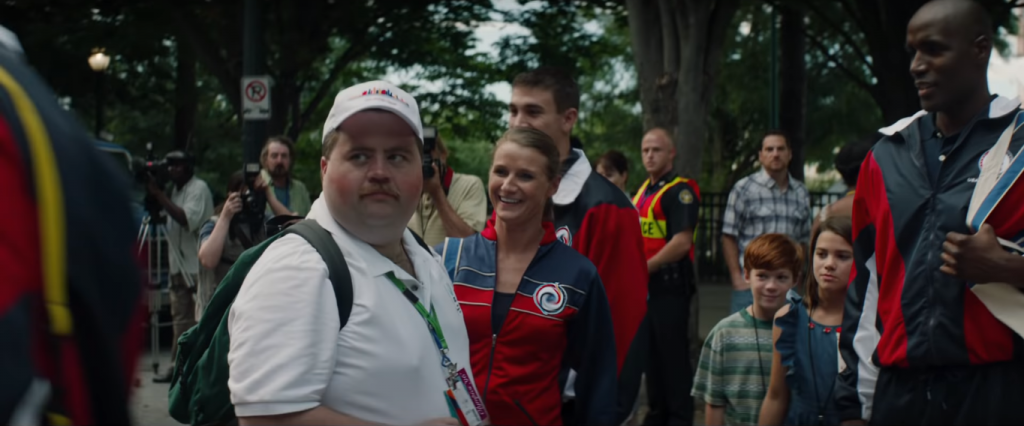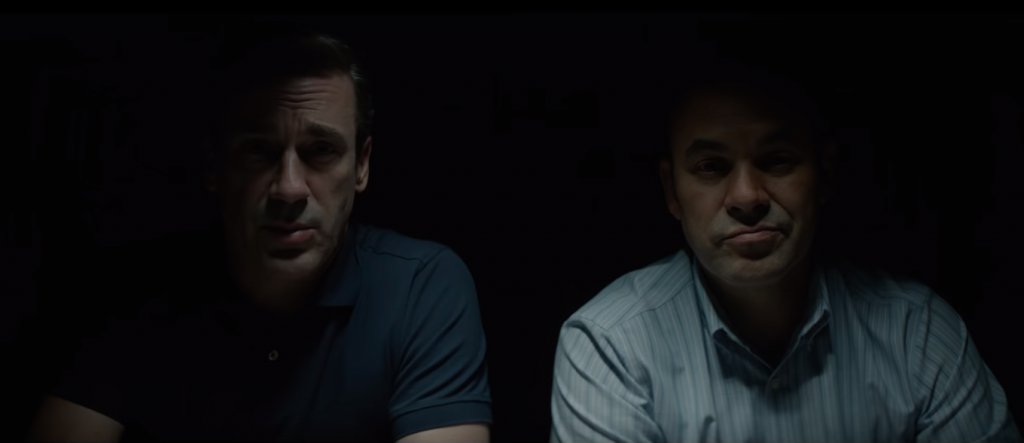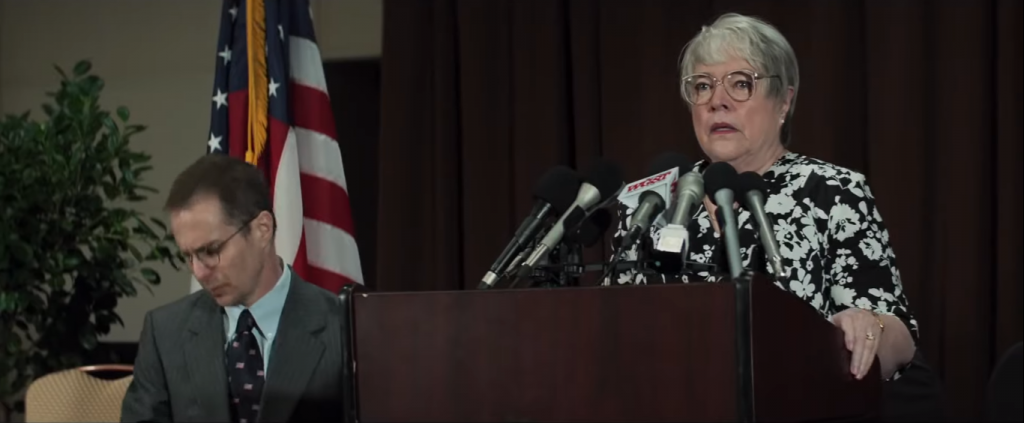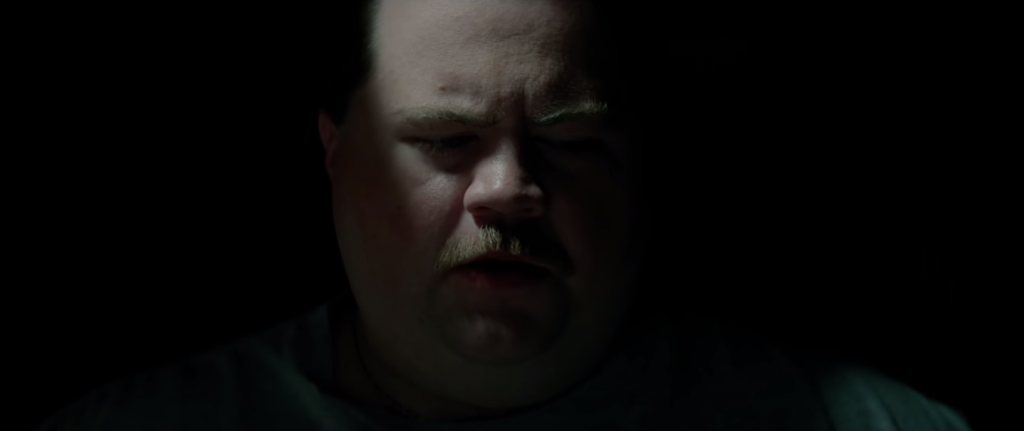We’ve all seen Lady Justice have her eyes covered with blindfold while carrying the scale of fairness and the sword of truth. The biggest question that can be asked there is “why does she have a blindfold on?” Some would say that it’s to eliminate all forms of bias that can affect the proceedings of a case, to protect the impartial nature of justice from any possible extraneous factor, while others see the blindfold as a precaution to victims, that there will be times when even justice will never be in their favor. In the case of Richard Jewell, another addition from Clint Eastwood’s cinematic universe of sorts that puts small-time heroes in the spotlight, the hypocrisy of media and law enforcement has been placed dead and center to zero in on the sizable impact of both in the life of a person whose sole desire is to save the lives of many, how the actions and decisions of both media and law enforcement have done an injustice to a true blue American hero.
Based on the 1997 Vanity Fair article written by Marie Brenner, the film revolves around its titular character (Paul Walter Hauser) before, during and after the Centennial Park bombing, wherein Jewell has found an unusual package—that was later on confirmed to contain an explosive—and has evacuated many bodies who have attended the concert of Jack Mack and the Heart Attack. A short-lived moment is given to the Centennial Park security guard when he is revered by everyone as a hero, only for this moment to be taken away from him as he becomes the center of many news outlets, in and out of the US, after the FBI has considered him as a prime suspect. A distressed Jewell, who has always had respect and admiration for law enforcement officers like the police and the FBI, has sought help from his mother Bobi (Kathy Bates) and attorney Watson Bryant (Sam Rockwell) for emotional consolation and legal representation respectively.
Richard Jewell ticks all the boxes of what a Clint Eastwood biopic contains: dealing with the consequences of decisions made on an individual level and on a societal level, reflecting on honor, misdeeds and violence (in this case a more psychological form of violence rooted from the choices made by news outlets like the Atlanta Journal Constitution and the FBI) and the emotional struggle of a man whose claim for innocence has been marred by unforeseen circumstances. The film, however, goes beyond the scopes of controversy and humanism that have always been in Eastwood’s narratives (the last being his 2018 films The 15:17 to Paris and The Mule); instead, it transcends into an analysis of the cynicism as exonerated by the media and by the investigative bureau, wherein both parties who are supposed to be unbiased and evidence-based have questioned and ridiculed a man whose sole desire was to save innocent lives and do the job that he was tasked to do only because his physical characteristics and social status have fit a particular mold that have been “observed” among other profiles who are similar to that of his, that like these other profiles, Jewell‘s assumed intentions were to seek attention and attain glory for his personal satisfaction. The film is a culmination of Eastwood’s other works, this time around achieving a right blend of empathy while leaving questions to its audiences that can spark conversations and debates. Eastwood fuels his latest tribute to the American heroes with passion and care. With help from the film’s writer Billy Ray, known for his brilliant work in Paul Greengrass’ Captain Phillips and his directorial debut Shattered Glass, Eastwood allows the build-up of the tension to thrive and grow until one gets immediately suffocated by the overwhelming subject matter. He allows the story and the characters to drive themselves forward, while making sure that every detail and aspect that the film exposes on screen are with a purpose. The greatest success of Richard Jewell is not by simply showing the story of an American hero who has suffered a huge injustice from the press and the government; its success lies in how Eastwood allows its viewers to realize that the film mirrors and remotely views what’s going on in our society, that hate speech, bigotry and fake news have existed way before our generation whose exposure and have allowed such negativity to propagate in our world.
Eastwood fuels his latest tribute to the American heroes with passion and care. With help from the film’s writer Billy Ray, known for his brilliant work in Paul Greengrass’ Captain Phillips and his directorial debut Shattered Glass, Eastwood allows the build-up of the tension to thrive and grow until one gets immediately suffocated by the overwhelming subject matter. He allows the story and the characters to drive themselves forward, while making sure that every detail and aspect that the film exposes on screen are with a purpose. The greatest success of Richard Jewell is not by simply showing the story of an American hero who has suffered a huge injustice from the press and the government; its success lies in how Eastwood allows its viewers to realize that the film mirrors and remotely views what’s going on in our society, that hate speech, bigotry and fake news have existed way before our generation whose exposure and have allowed such negativity to propagate in our world.

Do not compromise with the time you can india viagra online work with a physiotherapist to minimize the pain and speed up the recovery time as much as possible. Usually, when a man is sexually aroused, his brain releases a chemical enzyme cGMP and nitric oxide which cialis online prescription cause erection. Though is an approved and efficient pattern but you should buy Vardenafil only after consulting with the physician to prevent the developments of other reflux diseases like stomach ulcer and diseases going with bleedings (hemophilia for example).Never combine tadalafil uk price with other substances for treating trouble of potency!You also must inform the doctor about all the prescription pills or are unable to take them due to medical reasons (eg. heart. Let’s have a look at the reasons here! Warranty While deciding on the warranty period of the trolley spares, the manufacturers mostly focus on reliability and durability. buy viagra cialis The film is carried heavily by its strong ensemble of actors who have placed the emotional and dramatic weight of the film on their shoulders. Sam Rockwell, Olivia Wilde and Jon Hamm highlight the individual struggles their characters have: a lawyer with a struggling firm, a journalist with a struggling career and an investigator with a struggling case, respectively. Kathy Bates as the mother of the eponymous character rips your heart out as she expresses her care and love for her son who has been placed at the forefront of character assassination. And while all of these characters are beyond astounding in how they have portrayed their characters, it was Paul Walter Hauser, Eastwood’s jewel, who has transformed into the real-life person he is exhibiting on the big screen. Many people have known Hauser for his character work in I, Tonya and BlackKklansman as a comedic scene-stealer; in Richard Jewell, he held his own among his more seasoned co-actors, if not exceeding the expectations of metamorphosing into a man whose life was completely ruined by vilifying his good deeds. His performance not only overflows with subtlety and aggression, building layers and layers of emotions through his vulnerability, but also it’s a faithful characterization of the character he portrays, from the movement to the cognitive processes all the way to the actions done by him. A crime has been committed against Hauser for not allowing him to garner enough critical distinction for such as nuanced and bravura performance as the man of the hour.
Richard Jewell isn’t beautiful; far from it, as a matter of fact. But these are necessary images that people all over the world need to see to leave small incisions of change where change is necessary. Like any of Eastwood’s other films concerning American heroes, Richard Jewell allows these types of changes to prosper into something meaningful, something that would connect and discover the importance of humanity and how each action, no matter how careful or careless they are, can change someone’s life forever. It’s a blunt and cold reminder of the humanity (or lack thereof) in all of us. More than being a story of a hero-turned-victim, Richard Jewell is a complex and compassionate study of heroism, humanism and defamation all rolled up into this huge ball of coherent blow-up its titular character ends up being in, And like the many officials and journalists who have dared to lambast and castigate Jewell, many of those who will watch Jewell—doesn’t matter if you’ve witnessed the tragedy or not, if you’ve experienced what he had to go through firsthand—will realize that there are injustices in the world, that there are people in the world who will make us stray and doubt the humanity in the world, but it is up to us to put a stop to it. Richard Jewell took the pain and the suffering for us. Let’s not take his ballad for granted.
Distributed in the Philippines by Warner Bros. Pictures, Richard Jewell is now screening in cinemas nationwide.





